3:10 to Yuma
 for violence and some language.
for violence and some language.
Reviewed by: Michael Karounos
CONTRIBUTOR
| Moral Rating: | Very Offensive |
| Moviemaking Quality: |
|
| Primary Audience: | Adults |
| Genre: | Western Crime Drama Remake |
| Length: | 1 hr. 57 min. |
| Year of Release: | 2007 |
| USA Release: |
September 7, 2007 (wide—2,500 theaters) |
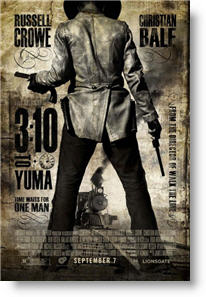
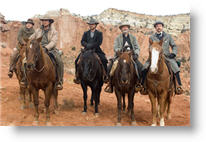
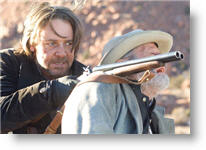

How can we know there’s a God? Answer
What if the cosmos is all that there is? Answer
Is Jesus Christ God? Answer
Why does God allow innocent people to suffer? Answer
What about the issue of suffering? Doesn’t this prove that there is no God and that we are on our own? Answer
Does God feel our pain? Answer
What kind of world would you create? Answer
Hypocrisy in the Church — “I would never be a Christian; they’re a bunch of hypocrites.”
How does viewing violence in movies affect the family? Answer
Every time you buy a movie ticket or rent a video you are casting a vote telling Hollywood “That’s what I want.” Why does Hollywood continue to promote immoral programming? Are YOU part of the problem?

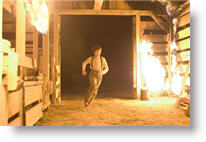


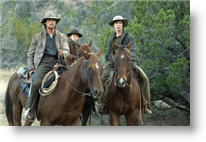
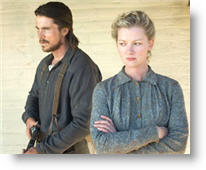
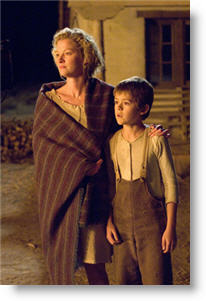
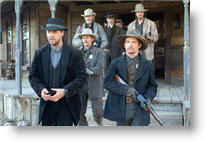
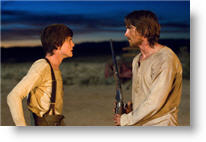
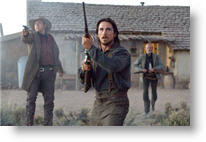
| Featuring |
|---|
|
Russell Crowe … Ben Wade Christian Bale … Dan Evans Peter Fonda … Byron McElroy Ben Foster … Charlie Prince Kevin Durand … Tucker Luke Wilson … Zeke Alan Tudyk … Doc Potter Gretchen Mol … Alice Evans See all » |
| Director |
| James Mangold — “Walk the Line” (2005), “Kate and Leopold” (2001), “Girl, Interrupted” (1999) |
| Producer |
| Ryan Kavanaugh, Lynwood Spinks, Stuart Besser |
| Distributor |
“Time waits for one man”
James Mangold’s film, “3:10 to Yuma,” is a remake of a classic 1957 movie starring Van Heflin and Glenn Ford. Much has changed in 50 years. The original movie portrays the outlaw band as ruthless killers, the authorities hunting them as cowards, and the lone farmer as a brave man striving to win the approval of his wife.
In what Mangold calls in one interview his “reinterpreted” version of the movie, the outlaw Ben Wade (Russell Crowe) is a Bible-quoting killer; Bryan McElroy (Peter Fonda), the bounty hunter hunting them, is a Bible-quoting killer; while Dan Evans the farmer (Christian Bale) is a killer whose primary virtue appears to be that he kills without quoting the Bible.
In Mangold’s moral universe, it’s not killing that’s evil; it’s hypocrisy. Evans’ only concern is getting enough money to buy the water rights to relieve his cattle and crops of the drought. If he has to kill a few outlaws in the process, what’s wrong with that? As long as he doesn’t quote the Bible, the audience will know who the good guy is.
In fact, the characters are all corrupt, even Evans takes money in a cause that he knows requires him to kill to earn it. In that decision, he is no different than the bounty hunter, except that the script portrays him as a good man doing bad things for reasons beyond his control. The morality that such a secular worldview expresses is a bankrupt one. If determinism of one kind or another excuses killing, than why shouldn’t Wade be excused for killing because he was abandoned by his mother or McElroy for killing because his environment bred hate? In other words, there is no moral standard in the movie which decides which of the three characters is “better,” just an arbitrary, political preference for a non-Christian character.
How do I know what is right from wrong? Answer
Are we living in a moral Stone Age? Answer
What do many Hollywood celebrities believe about spiritual issues? Answer
The movie self-consciously attacks Christianity, but it teaches nothing because there is nothing that Mangold believes in that he can communicate. For example, there can be no commentary about honor or truth in a movie in which both honor and truth are shown to be hollow principles. The government lies, the Bible lies, and lawmen are cowards, hypocrites, and killers. In such a universe, with such a worldview, what can a propagandistic director like Mangold teach us except to hate the “haters”—the “Christians”?
Indeed, the Bible plays a major role in the movie. Wade quotes and names verses from Proverbs 13:3 (“He who guards his lips guards his life, but he who speaks rashly will come to ruin”) and from Proverbs 21:2 (“All a man’s ways seem right to him, but the LORD weighs the heart”). He relates the story of how he was abandoned by his mother when he was eight years. She told him she was coming right back and gave him a Bible to read. For three days he read it, and when he finished it he realized his mother wasn’t returning. I can only surmise that the moral of that tendentious bit of storytelling is that children shouldn’t trust mothers who carry Bibles.
The anti-Christian speeches are over the top. For instance, in the fourth self-conscious reference to Christianity, Wade recounts a slaughter of Indian men, women, and children which begins with killing, proceeds to scalping, and anti-climactically concludes with children crying. This tale is supposed to convince the audience what a horrible man McElroy is, and Wade concludes it by saying: “I guess Byron imagined that Jesus wouldn’t mind. I guess Jesus don’t like the Apache.”
Now, what is one to do with such a stunning display of ignorance of the Christian faith or of the character of Jesus? Unlike Islam and the Koran, which specifically instruct believers to kill non-believers, the New Testament teaches that Christians are to love their enemies, to turn the other cheek when struck, and to give whatever a needy person asks for—all actions modeled by Jesus. Such gross propaganda should disgust Christians, but a few of the Christian students I sat with merely laughed. For them it was too ludicrous to take seriously. In the fifth reference to Christianity, Wade asks McElroy “Did you ever read another book besides the Bible?” McElroy’s predictable answer is “Nope.” The moral there, for audience members too dense to interpret character, is what else can one expect of a mass murderer except that he must be a murderer because he read the Bible?
Perhaps the most ridiculous images in the movie are the three distinct camera shots of Wade’s handgun which has a silver crucifix medallion on the handle. As if that weren’t enough to convey his heavy-breathing message, Mangold made sure to have the characters refer to it as the “hand of God” which contains a “curse on it” (i.e. Jesus).
Finally, in a moment of crisis, Evans says to his wife: “I’ve been standing on one leg for three damned years waiting for God to do me a favor, and he ain’t listening!” That is the movie’s summa: God, if he exists, is indifferent to our sufferings. This isn’t a Christian belief, but somehow it’s supposed to reflect on Christianity? If you don’t believe in God, you can’t blame him for human cruelty; blame humans. If you do believe in God, then you can only know him from the Bible which, the complexity of the Old Testament aside, clearly shows in the New Testament that God is a God of love.
It seems to me that Christians have a simple but stark choice. Either we continue to patronize entertainment which specifically attacks our faith or we don’t. The basis on which we make our decision will reveal the rule by which we live. Do we side with the aesthetic beauty of Mammon, the glittering god of this world, or do we make decisions based on moral principles and a genuine love for God?
“VOTE” WISELY—Every time you buy a movie ticket or rent a video you are casting a vote telling Hollywood “That’s what I want.”
Either way we must subscribe to one side or the other. Jesus made it clear that we can’t love both and must “hate” one in such a way as to exclude either God or the grosser fruit of the world from our lives. What Aristotle calls “the ruling principle” of our lives is true in a Christian sense as well, as Paul so poignantly describes in Romans 7 or Augustine painfully describes in his autobiographical chapter on stealing pears. This is not a matter of Sunday school morality but a true philosophical dilemma.
Those Christians who justify seeing any amount of violence, of sexuality, or of anti-Christian polemics by parroting the cheap excuse that “all truth is God’s truth” are missing the point in a huge way. The Christian life is not about justification and the freedom we are granted under the cross; apparently for some people, limitless dispensation of grace. The point of the Christian life is sanctification or, to put it another way, maturity: “Therefore let us leave the elementary teachings about Christ and go on to maturity, not laying again the foundation of repentance from acts that lead to death, and of faith in God” (Hebrews 6:1). The object of the Christian faith is not to believe in Jesus and live like the devil; it’s to believe in Jesus Christ so that we may live like he lived.
The movie is well-directed, well-acted, beautifully filmed, and effectively mocks Jesus, the Christian faith, and throws in a heavy dosage of anti-Southern bigotry. It always amazes me that people who purport to be “tolerant” when given a chance to express themselves manage to articulate such an unbridled hatred for Southerners and Christians. Are Southerners and Christians really the problem in the world? You wouldn’t know about Islamic terrorism if you depended on Hollywood for your world view.
Avoid this movie, and for the price of just a little more than a single ticket you can purchase the original from Amazon if you’re interested in the story and not in giving the devil his due.
Additional note from the reviewer (Oct. 1, 2007): I understand that some viewers are confused by my judgment of the movie as being anti-Christian. I attribute it to the fact that there is so much anti-Christian material in the media that Christians have become inured to it. There are two ways to know whether a movie is anti-Christian or not:
- Does the movie single out Christians as the bad guys? If no other religious group is being portrayed negatively then the anti-Christianity is not a bug, it’s a feature!
- Look up the director’s interviews. Here’s a quotation where Mangold compares Christians to terrorists:
“You’ve got Peter Fonda defending his murders by quoting Christ; you’ve got Russell Crowe quoting the Old Testament in defense of his killings. An awful lot characters are using the Bible as a justification for violence, and I don’t think that that’s not going on in our society right now, whether it’s on the side of terrorists or on the side of America.” source
If the director explicitly compares people who read the Bible to terrorists, then he is being anti-Christian.


Offensive / 4½
Very Offensive / 4½
I think some of your more thinking and intelligent readers would have the sense to figure out that the remark was not meant as an attack on God and Christianity, but on hypocrisy, the very nature of the offense requires that it be pointed out. …if a film like “3:10 to Yuma” challenges Christians or non-Christians to take an honest look at their own hypocrisy, and become more caring, morally conscious people …then I would say it deserves a moral rating far higher… What a sad review to have to read about a morally good film, which is hard to find these days.
Good / 4½
I do NOT believe, as the reviewer does, that 3:10’s intention is to attack Christianity or Christ: it remains neutral on the subject. Instead, 3:10 attacks the church, both then and now, and I believe that the criticism has much truth to it. For example, the movie’s character Byron, who is a good “Christian” man, has killed many Apache men, women and children—and feels no guilt for it. Wade criticizes Byron for not practicing what Christ taught; this is not an attack on Christianity, but an attack on hypocrisy. In Jesus' time, Byron would have been a Pharisee, not practicing what he preached. …“3:10 to Yuma” attacks Christian hypocrisy, not Christian doctrine or Christ. If you keep this analysis in mind, then watch the movie. It is the best film of the year so far.
Average / 5
I do not agree with the reviewers claim that this film was anti-Christian, I considered it to be a good character study of people in situations that are beyond their control. Ben Wade the killer is not a good man, he says so many times, and proves it more times then he says. Wade is a cold blooded killer and his men are more animals then men.
Dan Evans is a rancher who is on one leg, a sick son and a ranch that is a bout to be foreclosed on he is literally on the end of his rope when he signs on to escort Wade to the train station.
He is not a hired gun, he is a man trying to save his family, and himself as he is chased by Apache, Wade’s men and Wade himself.
Some people might find this film offensive and in the way of it being an R-rated film for violence, language and an implied scene of sexuality.
As I said above situations beyond their control, as we learn later Ben Wade was left at a train station with a Bible when his mother abandoned him, and although this by no means excuses what he did it does show a back story on to how he degraded to a cold blooded killer. Dan Evans has been kicked in the face so many times in the last five years, what with his son being sick, the Civil War and now loosing his ranch, it is no small wonder that he is having a crisis of faith. This is Hollywood people, it is not a Michael Landon Jr. western; there is not a redemptive end to this tale, but as much as we may not want to remember the Old West was not a nice place, and this movie portrays that nicely.
Offensive / 4½
Good / 5
- Reading the Bible does not make one a Christian.
- All have sinned and fall short of the Glory of God.
- Even when we try to do good, we end up doing evil. (Has the reviewer read Romans?)
- Even if you come to it slowly, it is important to do the right thing.
- Some things are worth dying for.
- Stepping aside for evil will not save you. (Look what happens to the Marshall of Contention and his men.)
The gun violence is extreme, though probably not to anyone who has played a lot of video games. On the whole a good movie, and while there are some caricatures of Christianity in the movie, there are caricatures of lots of people. This is not, in my humble opinion a Christian bashing enterprise. A movie worth seeing.
Better than Average / 4
It had it’s share of violence and bad language (so I would recommend it to adults not youngsters), but I think it made me think hard at how much some people have the truth distorted and why we as Christians must witness even to those who carry bibles. In Dan Evans, I saw a noble man wanting to do something right for his family, but because of the pressures of the world, he was going about it the wrong way. I come from Africa, and I have seen poverty and corruption push people to do sad things for the sake of their lives and family. In a nutshell, “blessed are the pure in heart, for they shall see God.” The pure in heart will still see God in this movie, so I recommend it even to mature Christians.
Better than Average / 5
Average / 4
I didn’t see the movie as being anti-Christian at all. When Dan says, “And God hasn’t been listening…” I think he echoes frustrations that a lot of us have felt when were going through one of the lowest points of our life. I didn’t believe that Dan’s character was anti God or agnostic or atheist. I just saw it as him going through an enormously stressful time in his life and beginning to question where God was. I think that’s a fairly common frustration that many Christians and non-Christians experience at one time or another in their lives. Maybe he didn’t have perfect faith. Maybe he wasn’t the best example of living the way Jesus would. But I didn’t feel he had to be in order to be an interesting character.
I really loved the interaction between Ben Wade and Dan. The psychology behind Ben Wade is really amazing. He was basically lost in life—thinking there was nobody in life who was honorable and kept his word. And then, finally, he meets Dan. And like most supposed “men of character” Ben believes Dan is really fake. He figures he’s just like everyone else. That he’ll cave on his principles given enough temptation. So for most of the movie, Ben offers various temptations. He tries to dissuade Dan using every clever method he can think of. And yet Dan doesn’t waver from his convictions. You can see how this clearly puzzles Ben. He doesn’t believe there really are men of character and yet here he is confronted by one. He begins to question his own paradigms.
By the end of the movie, Ben Wade is finally convinced that Dan is a man of character and Ben is obviously moved by it. So much so that he starts to help his own captor. It doesn’t fundamentally change who Ben is, which is realistic. But it does mean that Dan has earned Ben’s respect. And his paradigms about people have changed, albeit too late (in his mind) to change his ways.
This is the key theme of the movie—and I think most people miss it. If you miss this, then the movie doesn’t make a lot of sense. But if you get what’s going in, it’s a very compelling movie. In a way, Ben Wade is similar to Doc Holiday in Tombstone. He’s a bad guy from a bad upbringing, but one who longs for and respects people who are genuinely of good character. The problem, with both Ben Wade and Doc Holiday, is they almost never found such people in the real world. So they’ve basically lost hope. Yet when they both meet someone who is really of solid character, they are moved and changed. If you like good Westerns like “Tombstone,” I think you’d love this movie. I definitely did.
Moral rating: Good / Moviemaking quality: 5
Moral rating: Better than Average / Moviemaking quality: 4½
To me, first of all, I don’t believe at all this film is offensive to Christianity. At most, the film maker is questioning God, through this movie. “I’ve been waiting for God to do me a favor, but He didn’t do anything” —Dan Evans. Clearly, the main character of this film wants to believes in God, but there’re just some questions he didn’t know how to answer. Thus he is on a journey to find out, “I’m not alone, I have a little faith in me” —Dan Evans.
Ben Wade, on the other hand, I also believe he’s on a journey to find his own moral; too bad he wasn’t raised well, and nobody explained the bible to him, so he just pick and choose and interpret whatever he feels right to justify his own action. In Dan, he finds an “interesting” character, which he may be able to learn a thing or two from. Frankly, I believe the film maker also made it obvious, if Ben wants to escape, it would take him no effort, and he could have killed Dan’s crew 10 times, single handedly (just as he could kill his own gang in the end) But he didn’t, he deliberately stayed with them. He killed McElroy, he killed the other guy who burnt down Dan’s barn, but he didn’t kill Dan. Obviously, there’s something interested in Dan that Ben wants to find out.
I think this film is about a journey of masculinity. Dan wants to proof he’s a capable father; William wants to proof he’s “dangerous,” “fast,” and that he is a man; Ben wants to find out how to be a good man. Because the film maker himself is in this journey himself, he didn’t provide an answer for the movie viewer, instead he raised the question for everybody. So in the end, I believe the filmmaker also made it obvious and he gave the three characters their answers, but all with a touch of irony. Dan finally proofs he is capable because he put Ben on the train, and in front of Will’s eye. Ben helped Dan fulfilled his wish and he put himself on the train. Will helped saved his father by coming out at the right timing and pointing a gun at Ben’s head, and he also helped his father at the train station with the cattles.
Moral rating: Better than Average / Moviemaking quality: 4½
Moral rating: Offensive / Moviemaking quality: 4½
But, I gotta say I completely disagree with the original reviewer. As far as Mangold’s comments, he wasn’t calling Christians terrorists. He was pointing out that many people IRL use God as an excuse for what they think is right, to defend their actions, just like people in the movie do. And he’s totally right. I could go off into a historical recitation of just the last century, people who have tortured and killed, or been instruments of hate, all in the name of God. I think Mangold was just showing real life… that reading the Bible doesn’t make you righteous, and that’s correct, and a good message IMO. Also, he shows that people can quote scripture, like Ben Wade, but they not only don’t follow it, they don’t understand it because they still live in darkness. How many non-believers have any of you heard quote scripture to prove a point? I’ve heard several over the years.
Russell Crowe himself made a point in one of his interviews that Ben Wade reached the New Testament in his reading about the same time he probably realized his mother wasn’t coming back, but instead of embracing the God of Love, he is stuck in the Old Testament with the God of Vengeance.
I actually got almost the opposite effect from this movie. Strangely enough, I saw Ben Wade as a tremendously scarred character, and it brought to mind the fact that people like him are often given up on and discarded by society, which is one reason they just seem to get worse and worse. I even am actively praying for God to show me the hurting “Ben Wades” of the world, so that they might get to know the God of Love.
I think it’s obvious Ben Wade wants to believe in a loving God and decent men who do what’s right. He sticks around Dan (who may very well be the first “stand up” guy he’s ever known) for a reason. I also don’t think that him saying the gun has a curse on it has anything to do with saying Christians or Jesus is a curse. In fact, quite the opposite: Ben Wade is searching for the God of Love that has seemed to allude him his whole life. He sees HIS life as cursed, and since the gun is an extension of him, it is cursed, also, since it is this gun he uses to exact his vengeance.
I do think Dan is a man of faith, he’s just tired, and struggling to understand. Many other reviewers compare him to Job, or to the Biblical Daniel… with feet of clay(his wooden foot)…and in the hotel room right before the train, it is obvious he is praying while waiting.
There are actually good biblical lessons here: the man (Dan) is tempted at least three times to let Wade go, if he only takes the easy way out. Dan stands firm, and it is when he rebukes Ben’s last temptation of more money, that the rain clouds (after a three year drought) are finally over Bisbee.
There are many threes in this film, including the 3:10 to yuma title. Ben tries to dissuade or bribe Dan at least three times, the drought has lasted three years, it’s a three day journey to Contention from Bisbee, and several more I’m sure I’m forgetting. There is redemption in this film… Dan has finally found the strength to do the right thing, and Ben, influenced by Dan’s ultimate sacrifice, gets on the train so that the family will have a chance at a life. There is a very distinctive pause as he pulls his gun out of the holster towards the end of the film. He isn’t looking at the gun, with the crucified Christ on it, in the same way anymore. It is no coincidence that as Dan lays on the ground dying, Ben is standing over him and looks at the gun, and the crucifix, and turns the gun on Charlie Prince (who expected Ben to use the gun to finish off Dan). Ben may not yet fully understand the sacrifice of Jesus Christ, who gave up His life for our sins, but I believe by the end of the film, Ben does begin to understand that unconditional love(he witnesses it between William and Dan) is possible, and selfless sacrifice is also possible. It would be interesting to see how a sequel might be set up. Again, Ben isn’t fully “enlightened” yet, but the fact that he is forever changed for the better by knowing Dan is irrefutable.
There are many good moral lessons in this film. I don’t think the movie was knocking Christianity or Christ, so much as it was saying that people should be true to themselves and do the right thing even when it’s not the easiest most convenient answer.
I just wish it wasn’t rated R, with so much cussing and violence, as I realize a lot of people don’t have the type of players that can filter out the junk. It might be best to avoid this movie until it’s on network TV and most of the worst is edited out, and I definitely wouldn’t recommend it for children or even teens.
There are many more instances of goodness in the film, but I’ll stop here. I think I got my message across. I think that if you begin watching a movie looking for the bad things, you’ll find them, just as you will the good things, if that’s what you’re looking for.
I do think we should test every spirit and use discernment, and honestly in my spirit I have to wonder if the original reviewer watched the entire film, and if he did, did he already have his mind made up before watching it, what he was going to say about it? I think actually that in order to get the good messages that the film has to say, you need to pay extra special attention to everything said, and done, including facial expressions, because they reveal things about the hearts of these men that goes unsaid.
You may have to watch it twice to fully appreciate just what the film is saying. I enjoyed it the first time, but it wasn’t until the second viewing (I have watched it multiple times now) that I noticed things I missed the first time, and they were things that profoundly affected me and made me realize what a solid film this really is.
I have to add that Dan Evans only kills in self defense, and in fact, makes a point of telling his younger son that killing an animal is much different than killing a man. He also tells Ben Wade later in the film that 'wishing a man dead and killing him are two different things.'
…this isn’t a “family” film. I wouldn’t necessarily recommend it at all unless you have a TV Guardian or ClearPlay or some other device to mute/skip the most offensive stuff. I do think it has a good message, but I wouldn’t let a young child watch it even with things deleted out. Maybe a mature teen, otherwise, it’s for adults only.
Moral rating: Average / Moviemaking quality: 4
There is minimal language and exceptionally redemptive morals at the end. The violence is not for the faint of heart, but it was the wild West. “3:10…” is one of my favorite Westerns of all time.
Moral rating: Average / Moviemaking quality: 5
I believe Evans saw an opportunity to earn the money he needed for his family and cattle by escorting a prisoner to a prison train. Any killing he did was in self-defense and not gratuitous. Evans did not waver in his morals. Prior to seeing the movie, the previews did not provide much plot summary, so I was surprised that most of the characters were bad, though some seemed worse than others. I was going to walk out when I realized it was mostly about outlaws or oppressors (the man who wanted to keep the water from flowing to Evans' land). However, I stayed to see if Evans would fall victim to the lusts of the world like all the other characters in the movie. I was pleasantly surprised to discover he kept to his morals and accomplished his goal in spite of the price he had to pay.
I disagree with the reviewer about Evans' killing so he can get the water rights for his cattle. I believe in that day and age gun slinging was the norm and shooting was either in self defense or so one could do something evil, like Ben Wade and his crew killing to steal. I believe bounty hunters in that day and age had to kill or be killed to catch their bounty and for lawmen to maintain order. They didn’t have all the laws and technology to catch outlaws back then the way they do now. Also, from the westerns I’ve seen and not having lived during that time, outlaws didn’t have a problem with shooting people to avoid capture, so it seems a necessity for lawmen or bounty hunters to follow suit.
Please don’t misunderstand me. I am not saying killing is right, but when you’re in a war and completely outnumbered and outgunned it’s a matter of survival. I think we need to remember the context. They didn’t have bulletproof vests, rubber bullets, or gas canisters to use against the outlaws. If the bounty hunters, lawmen, etcetera didn’t use guns, they would’ve been killed themselves and there would’ve been no order.
Not that I agree with Mangold’s message, but his message may be that just because someone can quote the Bible, doesn’t mean he’s good or has a close personal relationship with God. Paul stated the same thing in Romans 3, among other books and chapters.
Overall, the language wasn’t that bad. (The movie “Bad Boys 2” was much, much worse). There were no sex scenes, though it’s alluded to with one character doing a sketch of another, kind of like in “Titanic.” Also, I appreciated the authenticity of the sets and wardrobe.
Average / 4
Average / 3
This is essentially a remake of the 1957 oater which starred Glen Ford and Van Heflin. It is serviceable largely because of the earnest craftiness of its two leads, who skillfully play off each other in a battle of wills, if not morals. Unfortunately, while the motives of the rancher are both noble and realistic, some of the actions of Russell Crowe’s character may leave you scratching your head, and while nebulous intentions can make for wonderful mystery, in the end you’re still not sure why Crowe’s dastardly Ben Wade has done what he’s done, and what it all means.
I had somewhat the same problem with the 1957 original, but whereas that was very taught and focussed on the psychology between the two leads, this remake includes a lot more action sequences which, though exciting in parts, tend to make the film meander and lose focus. However, this is an honorable addition to the long history of the Western on film and definitely worth a watch, mainly due to the interplay between the two leads.
The supporting cast is pretty good, too. Young Ben Foster makes the biggest impact as Charlie, psychotic second-incommand of the outlaws; and veteran Peter Fonda is enjoyably nasty as a bountyhunter who enjoys crowing over Crowe. The one disappointment is Gretchen Mol as Bale’s wife, who doesn’t make as much of her disgusted fascination with the outlaw as Leora Dana did in the original.
Although Crowe’s character does quote the Bible in places, I did not find it offensive like your reviewer appeared to. Parents should be warned that this movie is very violent and is gory in parts.
Offensive / 3½
Example number one: Actual Western history is replete with stories of townsfolk apprehending or actually gunning down gangs of outlaws. In 3-10, a small gang of outlaws quickly turns a whole town of armed citizens into a pack of killers by offering them cash on the barrelhead. Needless to say, such a gang of outlaws would have lasted about two minutes in the real West. For readers who are uninformed or misinformed about Western history, the “West” wasn’t tamed by a few sheriffs or U.S. Marshals. The West was tamed by armed citizens. This is an indisputable fact.
Of course, the lawmen and average citizens in the movie cannot hit the broadside of a barn with their firearms. Literally, in the movie, one lawman cannot manage to hit an outlaw within three feet of him. Meanwhile, the outlaws can shoot the whiskers off of a coyote at 200 yards with a hail of bullets.
All of this unrealistic nonsense transforms the hyper-realism of the scenery, violence, costumes and coarse dialogue into a tract for postmodernist anti-morality.
Example number two: The lawmen and farmer protagonist (“Dan”) cannot seem to secure their prisoner with even the simplest means. A whole group of lawmen seem unable to shackle and gag the antagonist. Therefore, he is free to verbally intimidate and even kill them one at time. Obviously, no modern police officer would allow such a thing. Now image a hardened group of Western lawmen putting one pair of cuffs on a killer and not even securing the cuffs behind the prisoner.
Here is the deal: I am actually old enough to have known men who were lawmen in the old West. At the simplest level of realism, 3-10 is a two hour insult spit in the face of the real men and women that subdued the West. For anyone vaguely familiar with the real West, 3-10 appears for what it really is—unabridged and unrelenting propaganda for postmodernist anti-morality.
Moral rating: Extremely Offensive / Moviemaking quality: 4½
But who in his right mind would produce a movie with this amount of violence for sheer entertainment? Yes, there is a certain moral theme within this movie, in which a husband and father, played beautifully by Christian Bale, tries valiantly to bring a bad guy to justice, knowing that he might get killed in his trying. But what little redeeming moments there are at the end do not offset the ugliness of the film and of the story. I think this is a warped movie, for Christian and non-Christian alike. I literally had to walk out of the theater room for 10 minutes to recover from the violence, then I went back in and saw the remaining 30 minutes of the film. I read a reputable reviewer’s opinion of this movie which stated that this movie lacks focus. Yes, that is indeed one of its flaws. The acting is good, but the movie as a whole is not that good. And the subject matter is repugnant.
Extremely Offensive / 3½
Moral rating: Offensive / Moviemaking quality: 4½
The Lord prompted me to read Psalm 37 the day after watching this movie. Read that chapter of the Bible, and you will see that, even though this is a fictional story, it can still be used to illustrate spiritual principles in our lives. But, again, this movie, if not viewed with discernment in the truth, can spiritually stumble those who are non-Christians or who are not spiritually mature.
***spoilers follow***
The character Dan Evans is a righteous man, but he lacks faith in God. He told his wife: “I’ve been standing on one leg for three damned years waiting for God to do me a favor, and he ain’t listening!” Three years is a long time, but it is shown in the movie that, even though Dan and his family try to teach their children good morals and live accordingly (and shown to say grace before a meal,) Evans makes decisions without consulting God. He does not make life decisions based on God’s truth, but on his own understanding, his own pride, and how others would think of him (his basis for declining Ben Wade’s offer to follow through with his mission.) That is, Dan does not try to seek God’s will and God’s promises. His “waiting for God,” does not include reading God’s word and through prayers to God. He was passively waiting. After three years, in a crisis, he decides to do what he can in his own effort and his own way to save himself and his family, and that is also where he goes wrong. Psalm 37 stated that God will not forsake those who obey or wait for him; God will not let them wither, instead, He will let them inherit the land and He will cut off the wicked. Supposedly this is a real life story, if only Dan Evans would hold tight to the truth, the outcome of his life would have been different. But we can still see God’s work in the story, as Dan’s offspring and property do not perish at the end (William and the amount of money Butterfield promised.)
The movie is trying to get the audience to see how Dan’s son, William, comes to respect his father, instead of always throwing insults at him. But the way Dan “earns” his son’s respect is not the right way. A child is supposed to listen to his parent; a father does not have to commit “heroic” acts in front of his son to earn his respect. But, what is good in the movie is that as the story progresses, William came to side with his father, instead of continuing his fascination of living freely and dangerously like Ben Wade, whom he admired in the beginning.
Another element in the movie that may spiritually stumble those who are non-Christians or who are not spiritually mature is how Ben Wade is portrayed in the movie. Ben is shown as being “a man,” not an “animal,” (how he refers to the rest of his gang to Dan at one point,) that there is actually good in Ben. Ben is shown to return Dan’s horses as promised; in the saloon he offered and paid Dan back for his “troubles.” At the end of the movie Ben is shown to have developed a “friendship” with Dan, and decided to help Dan become a “hero” to his children. But while these are righteous acts, they still do not redeem Ben Wade for the murders he has committed and the lifestyle he has lived. In my opinion, Ben Wade is still an evil man who commits murder whenever he “desires” it, that is, whenever anyone deliberately annoys him or opposes him.
In other words, Ben Wade is his own god. He does whatever he pleases. He spares whoever he likes and kills whoever he dislikes. There is no living God in his life. So even though he has read the Bible “cover to cover” and often quotes from it, he has not received the life from God’s word. He is still living in darkness and in death. As for the story and the movie itself, in the ending scene, instead of going to prison willingly and repenting of his sins, as the audience may have first assumes, we are hinted that Ben Wade is going to escape and “gets away with it,” continue living his “fun” and “free” life. But the truth is that, evil man will not just “get way with it.” In a short time, they will not only wither, but will be cut off. They will vanish, their power will be broken, and even their offspring will be cut off. (from Psalm 37)
Moral rating: Very Offensive / Moviemaking quality: 4
Don’t take me wrong though! There are some amazingly well done action sequences in this film that you’ll remember for a LONG time!… I saw this with my mom and dad. I did not feel weird sitting next to my mother during this movie which says a lot in itself. Now, I’ve only seen it once, but my impression was that it was more of a PG-13 rated movie. The language wasn’t white washed, but it wasn’t over the top cussing for cussing sake.
There is one sex scene, BUT, unlike most movies, there is NOT a long kissing scene as they strip each other down. You see wade sitting on a chair drawing a picture of the back of the woman. You see only down to the small of her back and no display of private parts, and the scene is very brief.
The action sequences, though few, are on a James Bond level of violence, not “Gladiator.” There are one or two places that explictly show a person being shot point plank, and those with weak stomachs should look away.
Christian References: I never felt my faith challenged or offended in the movie. But I was puzzled as to how this bible reading, scripture reading man ending up being a ruthless killer in the west. As far as blasphemes go, I can’t remember too well, but I would have to say a very low number if any. Movie Rating: 4½ / Content Rating: 4½ / Overall rating: 4½…
Good / 4½
What the reviewer said about both characters quoting scripture is inaccurate. Wade quotes from Psalms, but Evan’s never does. And even if he did, he is not a bad person quoting for his own justification, unlike Wade. The only reason Dan Evans chooses to help escort Wade to the train station, is because he will be paid $200, which he needs to keep his farm since the railroad passes right over his land. Eventually, when everyone else abandons him, he knows he might die, but he is willing to sacrifice himself as long as he brings Wade to justice.
Moral rating: Average / Moviemaking quality: 5



Ben Wade grew up knowing only the worst in people. Robbing and killing with a loyal gang of killers, he is fearless. Because his mother deserted him at such a young age with a Bible, he read it in three days and quote from it to his needs, an irony on display about the moral value of the people around him. Even his gun is emblazoned with gold crucifixes. He’s a perfectionist brute, yet charming and intuitive.
Dan Evans' land has no water after a long season of drought which leaves him in debt, and Mr. Hollander wanted his land. Dan’s wife, Alice, and eldest son, William, are distant from him because of their current situations. In an event that promises golden opportunity to restore his pride and dignity and to pay off the debts, his mission is to help escort the captured Ben Wade to Contention to be put on the 3:10 train to Yuma.
On the way, between flying bullets and ruthless killers, we learn more about Ben and Dan. These two men could have been brothers and friends. James Mangold’s “3:10 To Yuma” is not just another spaghetti western. It is in the tradition of n’s “Unforgiven.” The script is tight, and Mr. Mangold’s reigns are assured. Both Mr. Bale and Mr. Crowe are excellent in their respective role.
There is no moral ambiguity. There are bad men and more bad men, except that one man tries to live soundly and lawfully. Dan has a family, a home, and a ranch, a place that he can called his own after serving in the Union Army and was injured. He doesn’t quote the Bible, but he tries to live to his best as evidence in his young son, Mark. Through Mark’s eyes, we see that Dan is a good father. When the event turns deadly, Dan rather have his children knows that he didn’t suffered in vain. Ben Wade sees this quality in Dan and it changes him.
My Ratings: Good / 4½